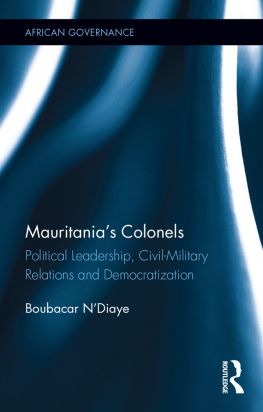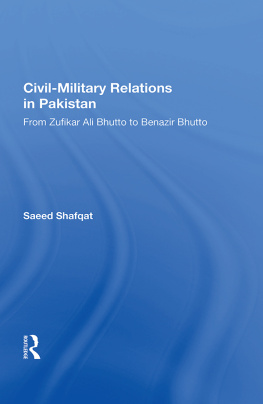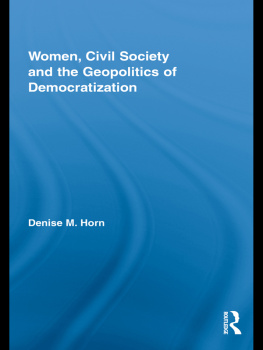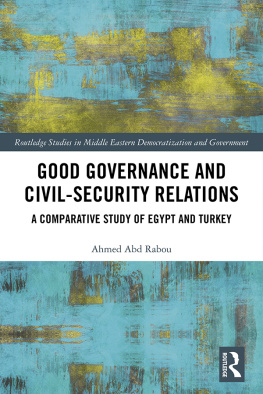Mauritanias Colonels
This book, the result of more than a decade of research, focuses on the sociopolitical dynamics and civil-military relations in a little studied country: Mauritania, located in the troubled Northwestern part of Africa. Boubacar NDiaye brings into light the political evolution of this country which holds lessons for African politics, and could affect the future of the West African sub-region.
Mauritanias Colonels examines the personalities and policy of five military officers turned heads of state who ruled Mauritania for nearly 40 years. After comparing and contrasting the personal traits, social origins, itineraries, and evolution as military officers, it critically evaluates the policies they enacted to address four key challenges their country faces. These are, namely, the difficult cohabitation between the countrys ethno-cultural communities, the illusive democratization and military withdrawal from politics, the judicious management of the countrys abundant natural resources to meet the socioeconomic needs of their people, and the prudent conduct of foreign policy given Mauritanias location, straddling Arab North Africa and Sub-Saharan Africa.
Showing the impact that each Colonel has had on the evolution of Mauritania, this book will be of interest to students and scholars of West Africa, African politics, civil-military relations and democratization processes.
Boubacar NDiaye is a professor of Africana Studies and Political Science at The College of Wooster, USA.
African Governance
1 Traditional Institutions in Contemporary African Governance
Edited by Kidane Mengisteab and Gerard Hagg
2 Non-State Social Protection Actors and Services in Africa
Governance Below the State
Edited by Nicholas Awortwi and Gregor Walter-Drop
3 State-building Interventions in Post-Conflict Liberia
Building a State without Citizens
Susanne Mulbah
4 Mauritanias Colonels
Political Leadership, Civil-Military Relations and Democratization
Boubacar NDiaye
Mauritanias Colonels
Political Leadership, Civil-Military Relations and Democratization
Boubacar NDiaye
First published 2018
by Routledge
2 Park Square, Milton Park, Abingdon, Oxon OX14 4RN
by Routledge
711 Third Avenue, New York, NY 10017
Routledge is an imprint of the Taylor & Francis Group, an informa business
2018 Boubacar NDiaye
The right of Boubacar NDiaye to be identified as author of this work has been asserted by him in accordance with sections 77 and 78 of the Copyright, Designs and Patents Act 1988.
All rights reserved. No part of this book may be reprinted or reproduced or utilised in any form or by any electronic, mechanical, or other means, now known or hereafter invented, including photocopying and recording, or in any information storage or retrieval system, without permission in writing from the publishers.
Trademark notice: Product or corporate names may be trademarks or registered trademarks, and are used only for identification and explanation without intent to infringe.
British Library Cataloguing-in-Publication Data
A catalogue record for this book is available from the British Library
Library of Congress Cataloging-in-Publication Data
A catalog record for this book has been requested
ISBN: 978-1-138-05948-1 (hbk)
ISBN: 978-1-315-16352-9 (ebk)
Typeset in Times New Roman
by Apex CoVantage, LLC
I dedicate this book to the countless victims of Mauritanias colonels. And to those who chose not to look the other way. Their courage is inspiring.
Contents
Detailed table of contents
In its original conceptualization, this book was supposed to be about Colonel Maaouya Ould SidAhmed Taya who was, until August 3, 2005, the president actually potentate of sorts of the Republic Islamic of Mauritania. The study then ambitioned to analyze and explain Colonel Ould Tayas long tenure as head of state since his unexpected rise to power on December 12, 1984. To be sure, much has happened since to amply justify going well beyond that initial limited goal, although such a study would have entailed examining closely the strange marriage between Mauritania and its military since that fateful July 10, 1978. But the idea to systematically compare Mauritanias heads of state was suggested to me in passing by the eminent Mauritanian diplomate, Ahmedou Ould Abdalla, then the Special Representative of the United Nations Secretary General for West Africa as I collaborated with his office on a study on African heads of state and life after the State House in 2005.
Still, having ruled the country for 21 years out of 50-odd years of its independence as a sovereign state, any analysis of this marriage which ushered in an era I have called Colonels Mauritania must, of necessity, devote a fair amount of space to his tenure and the evolution of the country under his leadership. Just as Colonel Ould Taya unquestionably did, the other colonels also had a major political impact for good or ill on Mauritania. To a large extent, they sealed its future.
Despite some improvement in recent years, Mauritania remains poorly represented in the English-speaking literature. As the only comparative analysis of the personalities and political records of Mauritanias colonels, this study holds valuable lessons for students of civil-military relations, leadership, and many other areas of Africa politics.
This books ambition is to upgrade Mauritania from an all but ignored subject of analysis to a legitimate subject of inquiry. Like that of any other African state, the political dynamics in Mauritania can help shed some light on some of the most enduring puzzles of politics generally. More specifically, Mauritanias experience with ethnicity and its incidence on democratization, and on the policy orientation of authoritarian regimes in African politics can indeed prove invaluable for political scientists and Africanists. It is my hope that this book will help them, and even lay people with an interest in African politics and, in the process, alert all to the perils stalking Mauritania and the whole of West Africa. If this study of Mauritanias colonels reaches this modest objective, it would have achieved a major accomplishment. That would make the decade-long efforts to complete it despite the hurdles that invariably come with studying taciturn authoritarian heads of state with an uncommon persecution complex all worth it.
As all authors know well, such a debt of gratitude is owed so many institutions and people that it would take many pages to fully acknowledge all those without whose assistance, direct or indirect, encouragements, patience, and other virtues they would not have completed their study. This is even truer for a study it took so long to complete. I am surely going to overlook many people, who, along the way, contributed in such ways to the completion of this book. It is not intentional. I must express my gratitude to The College of Wooster without whose generous funding through the Henry Luce III Fund for Distinguished Scholarship and several Faculty Development Fund Travel grants, I would not have been able to carry out the archival and field research, and the investigations that so enriched the study. Its support included providing sophomore research assistants who helped in a variety of ways, particularly library and online research. Komal Asit Mesvani was the very last one. Several colleagues at The College of Wooster and across the world have consistently shown genuine curiosity about and keen interest in my work, raised brilliant questions, and made pertinent and encouraging comments. Professor Harry Gamble of the French and Francophone Studies Department embodies such supportive attitudes. I am thankful for such support. It kept me going.











